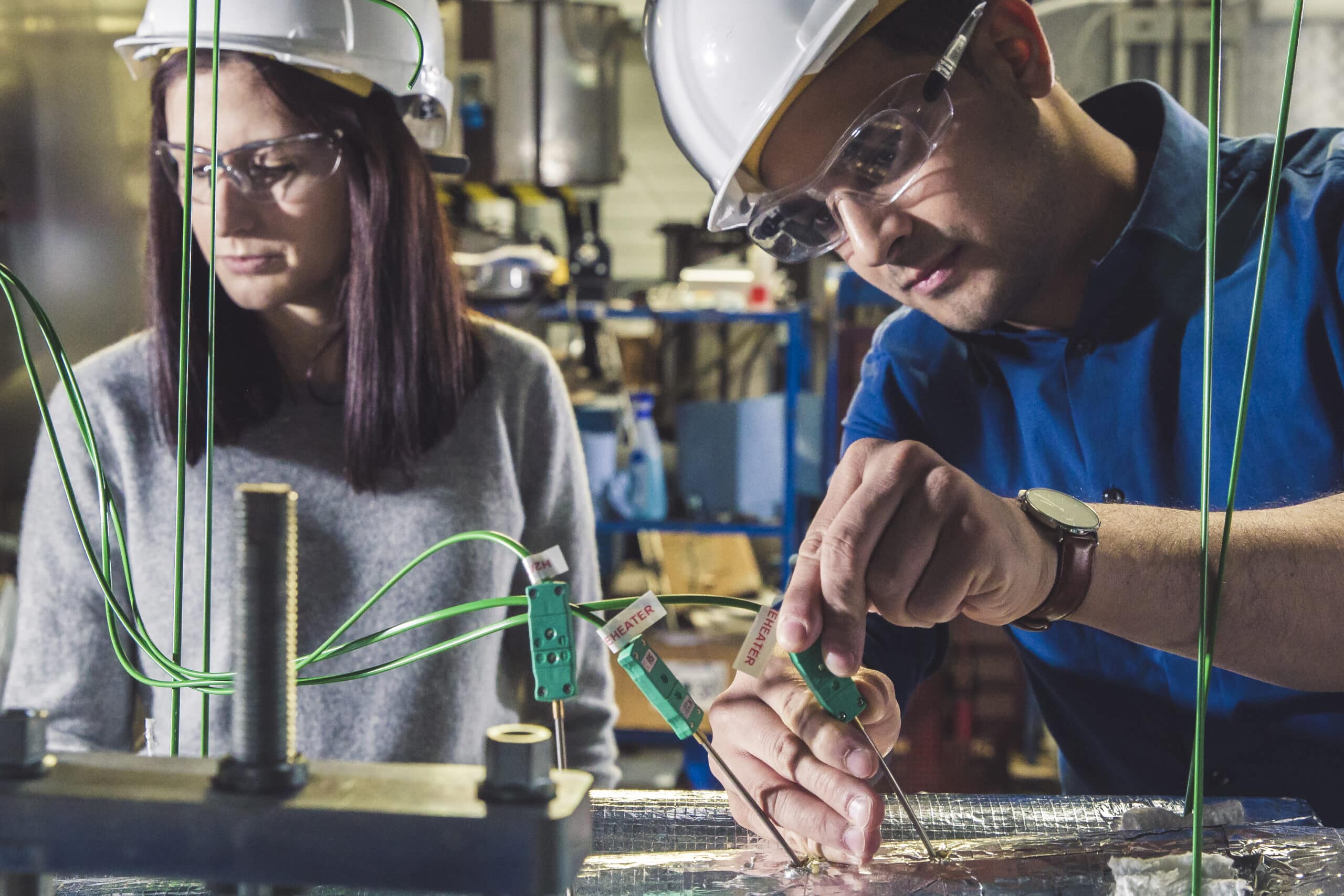Challenging, exciting, forward-looking – these are the three words Finley Underhill uses to describe his Cranfield University‘s School of Water, Energy and Environment education so far. “The pace of the course and the content is very technical and challenging,” says the Advanced Heat Engineering MSc student. “My technical understanding of process systems has increased dramatically in a relatively short space of time. My knowledge of real-world applications for novel technologies and the challenges they face and my perspective on multicultural appreciation have matured greatly for the better.”
These are just some of the outcomes of the world-class programmes at Cranfield — the kind that spurs students to find the drive to identify and deliver the changes required to achieve a brighter future for Earth.
This starts by learning from the best. Many of the teaching staff have industry backgrounds and are leading academic experts in their fields. With an 8:1 staff-to-student ratio, students can truly soak in their input to one day deliver practical solutions that boost efficiency and reduce their impact on the environment in their respective fields.
More inspiration can be found within the world-renowned Energy and Sustainability team. Some of its exciting breakthroughs include launching the first sustainable waste management symposium, collaborating with universities to train global talents, and helping students research potential plasma applications to reduce the amount of water used for cleaning solar mirrors.
“Our University motto says ‘after clouds, light’ and this is more important than ever. We are taking the lead in building a more sustainable future after COVID-19,” says Professor Angel Medina-Vaya, Lead for Sustainability at Cranfield and Director of Environment and Agrifood.
“We are combining all the academic and industrial knowledge gained over the last 75 years to shape a green economy. We work alongside some of the world’s leading companies and organisations helping them transition to more sustainable business practices.”
Students participate in these impactful initiatives in the form of group projects. Tailored to their personal interests and career aspirations, these stints with industry partners place MSc students in companies to work on projects. These span techno-economic analysis of small modular reactors with CO2 and thermal storage for grid flexibility, design and engineering development of cold thermal energy systems, or performance assessment of an absorption chiller and a desalination unit integrated to renewable plants, to name just three.
These group projects are central to Cranfield’s MSc courses. They allow students to work across disciplines with fellow students from other MScs and work on tackling real-world challenges often set by Cranfield’s industrial partners.
Maria Fernanda Peniche Luna, a Food Systems and Management MSc graduate, valued this a lot. She mastered how to work in a team, think critically, and adapt – skills which have helped her since she joined leading agriculture company Syngenta’s graduate programme. “I feel very grateful and accomplished after successfully completing my MSc,” she says.
Perhaps more profound still is how her time at Cranfield helped her understand her role in a new global green economy and develop her skills and knowledge to lead the change and make an immediate impact. “Food Chain Resilience was the most memorable module,” Maria says. “This module was the one that motivated me to be in the job I am now. Learning about procurement and sustainability has been very useful in my day-to-day job.”
At Cranfield, students can expect to receive plenty of support from their coursemates and academics . “My coursemates have always been supportive of each other when the topics get difficult and we always help to explain things in different ways until everyone understands,” says Finley. “I have also received support with mental health from the excellent staff when facing difficult personal issues.”
With an emphasis on quality research, Cranfield has cemented itself among the top 50 universities in the world for Engineering – Mechanical, Aeronautical and Manufacturing (QS World University Rankings by Subject 2022).
As much as 88% of Cranfield‘s research has been classified as “world-leading” or “internationally excellent”, according to the Research Excellence Framework 2021. The university has also been named an Official Nominator for The Earthshot Prize – the world’s most prestigious environmental award launched by the Prince of Wales in 2021.

Cranfield University’s world-class facilities allow the university to conduct impactful research. Source: Cranfield University
It’s little wonder why 96% of Cranfield graduates are employed or in further study. Many have secured jobs in organisations like Airbus, BP, Deloitte, Oxfam, PepsiCo, PwC, Rolls-Royce, Singapore Airlines, Unilever, Water Aid and Williams F1. Where better to make a positive impact on the urgent need to tackle climate change?
Anyone who chooses to gain a qualification from Cranfield will be ready to build a more equitable and sustainable future. Its postgraduate offerings include MSc courses in Advanced Chemical Engineering, Advanced Digital Energy Systems, Advanced Water Management, Future Food Sustainability, Environmental Engineering, Renewable Energy, Water and Sanitation for Development, and Water and Wastewater Engineering.
The various scholarships, such as the Brian Meredith Net Zero Scholarship, are available to make it easier for students to pursue a wide range of MSc courses. The Brian Meredith Net Zero Scholarship, in particular, was provided by Green Future Investments Ltd – an organisation established to continue the environmental work and legacy of Brian Meredith, an entrepreneur and ex-IBM engineer.
Ready to build a sustainable future? Discover how you can join the university’s global sustainability efforts here.
Follow Cranfield University on Facebook, Twitter, Youtube and Instagram.











